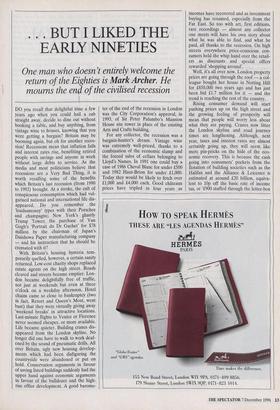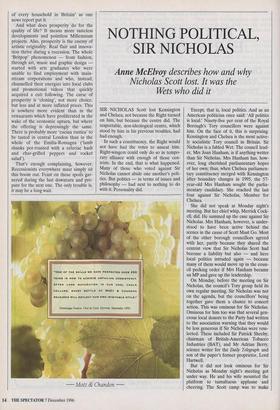. . . BUT I LIKED THE EARLY NINETIES
One man who doesn't entirely welcome the
return of the Eighties is Mark Archer. He
mourns the end of the civilised recession
DO you recall that delightful time a few years ago when you could hail a cab straight away, decide to dine out without booking a table, and buy anything, from vintage wine to houses, knowing that you were getting a bargain? Britain may be booming again, but oh for another reces- sion! Recessions mean that inflation falls and interest rates rise, benefiting retired people with savings and anyone in work without large debts to service. As the media and most politicians believe that recessions are a Very Bad Thing, it is worth recalling some of the benefits which Britain's last recession (from 1990 to 1992) brought. At a stroke, the cult of conspicuous consumption which had vul- garised national and international life dis- appeared. Do you remember the `loadsamoney' types with their Porsches and champagne; New York's ghastly Trump Tower; the purchase of Van Gogh's 'Portrait du Dr Gachet' for $78 million by the chairman of Japan's Daishowa Paper manufacturing company — and his instruction that he should be cremated with it?
With Britain's housing hysteria tem- porarily quelled, however, a certain sanity returned. Low-cost charity shops replaced estate agents on the high street. Roads cleared and streets became emptier. Lon- don became delightfully free of traffic, not just at weekends but even at three o'clock on a weekday afternoon. Hotel chains came so close to bankruptcy (two in fact, Resort and Queen's Moat, went bust) that they were virtually giving away 'weekend breaks' in attractive locations. Last-minute flights to Venice or Florence never seemed cheaper, or more available. Life became quieter. Building cranes dis- appeared from the London skyline. No longer did one have to walk to work deaf- ened by the sound of pneumatic drills. All over Britain, ugly new housing develop- ments which had been disfiguring the countryside were abandoned or put on hold. Conservation arguments in favour of saving listed buildings suddenly had the upper hand against economic arguments in favour of the bulldozer and the high- rise office development. A good barome- ter of the end of the recession in London was the City Corporation's approval, in 1993, of Sir Peter Palumbo's Mansion House site tower in place of the existing Arts and Crafts building.
For any collector, the recession was a bargain-hunter's dream. Vintage wine was extremely well-priced, thanks to a combination of the economic slump and the forced sales of cellars belonging to Lloyd's Names. In 1991 one could buy a case of 1986 Cheval Blanc for under £500 and 1982 Haut-Brion for under £1,000. Today they would be likely to fetch over £1,000 and £4,000 each. Good châteaux prices have tripled in four years as incomes have recovered and as investment buying has resumed, especially from the Far East. So too with art, first editions, rare recordings — almost any collector one meets will have his own story about what he was able to find, and what he paid, all thanks to the recession. On high streets everywhere price-conscious con- sumers held the whip hand over the retail- ers as discounts and special offers rewarded 'shopping around'.
Well, it's all over now. London property prices are going through the roof — a col- league bought her house in Notting Hill for £850,000 two years ago and has just been bid £1.7 million for it — and the trend is reaching the rest of the country.
Rising consumer demand will start pushing prices up on the high street and the growing feeling of prosperity will mean that people will worry less about what they are paying. Cranes now litter the London skyline and road journey times are lengthening. Although, next year, taxes and interest rates are almost certainly going up, they will seem like mere pin-pricks on the hide of the eco- nomic recovery. This is because the cash going into consumers' pockets from the flotation of building societies such as the Halifax and the Alliance & Leicester is estimated at around £20 billion, equiva- lent to 10p off the basic rate of income tax, or '£900 stuffed through the letter-box of every household in Britain' as one news report put it.
And what does prosperity do for the quality of life? It means more tasteless developments and pointless Millennium projects. Also, prosperity is the enemy of artistic originality. Real flair and innova- tion thrive during a recession. The whole 'Britpop' phenomenon — from fashion, through art, music and graphic design — started with arts graduates who were unable to find employment with main- stream corporations and who, instead, channelled their energies into local clubs and promotional videos that quickly acquired a cult following. The curse of prosperity is 'cloning', not more choice, but less and at more inflated prices. This is nowhere more evident than in the restaurants which have proliferated in the wake of the economic upturn, but where the offering is depressingly the same. There is probably more `cucina rustica' to be tasted in central London than in the whole of the Emilia-Romagna ('lamb shanks pot-roasted with a celeriac hash and char-grilled peppers and rocket salad').
That's enough complaining, however. Recessionists everywhere must simply sit this boom out. Feast on those spoils gar- nered during the last downturn and pre- pare for the next one. The only trouble is, it may be a long wait.



















































































 Previous page
Previous page